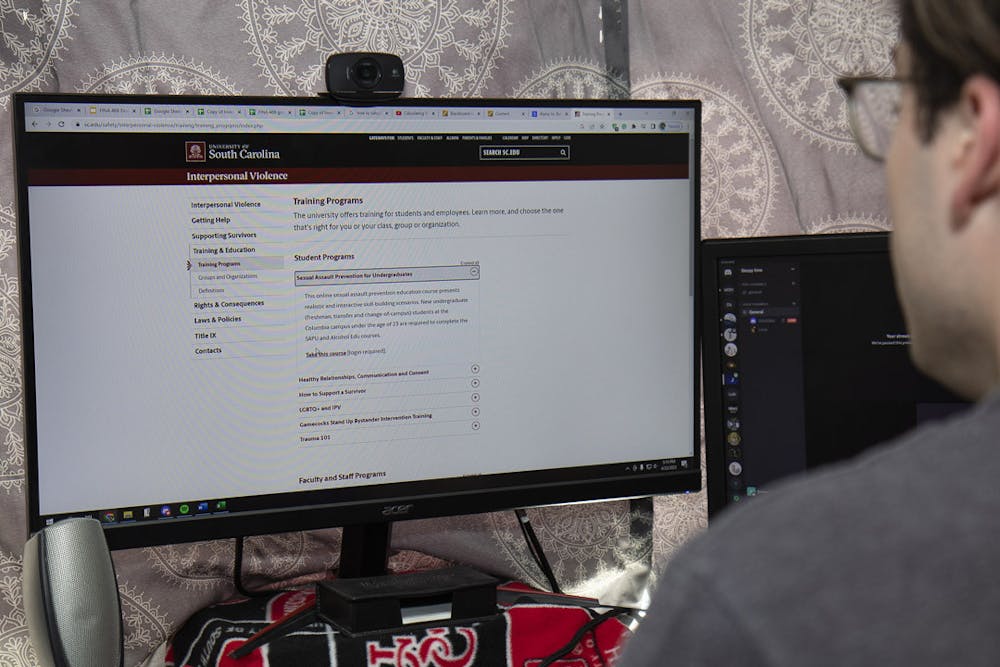There needs to be more accessible and private ways for students to opt out of USC's mandatory Title IX training if it is triggering to them.
Imagine that you’ve just been admitted as a student at the University of South Carolina and are eager to finally sign up for classes when you notice there is a hold on your self-service account. In order to register for classes, you must complete the required community education modules, including one focused on sexual assault prevention.
However, if a student has experienced sexual violence at some point in their life, certain parts of this mandatory program have the potential to be triggering. Some of the sections include in-depth scenarios or personal questions involving topics of sexual assault, harassment, stalking and domestic violence.
There is no content warning until after the first two-minute pre-assessment, and there is no information at all on the options for withdrawing from the modules.
Failure to complete the program will result in a hold on your account, preventing you from registering for classes or joining any on-campus organizations. The Clery Act, which is a law aimed at ensuring students are educated on different crime policies and demographics, mandates this training on a federal level.
Aimee Hourigan, the director of Substance Abuse Prevention and Education at USC, and her office oversees both substance abuse prevention and sexual assault prevention education for new students. She said that there is a way to opt out of the program if the student is already in communication with USC's Sexual Assault and Violence Intervention and Prevention (SAVIP) organization.
“You can email SAVIP and ask,” Hourigan said. “I’m assuming they would make you come in and have a conversation with somebody just to verify that you’re being truthful and not just trying to get out of it.”
Hourigan said the content used in USC's programs comes from a company called Vector Solutions, which they've used for ten years.
“(Vector Solutions) do a lot of research before they put the content out,” Hourigan said. “They do focus groups with college students (and) they make sure there's experts involved so that it covers all the content it needs to meet the federal requirements, but also so that it’s done in a way that is interesting, engaging (and) realistic.”
While it's important that students gain insight into an honest perspective about sexual assault, "realistic" content could be extremely triggering to victims who may have shared a similar experience.
Alexis Rudnik, a program coordinator for SAVIP, said that triggers for victims of sexual violence vary depending on the individual.
“Some people remember everything, like every single detail,” Rudnik said. “Some people don’t remember anything at all.”
According to Rudnik, allowing students who feel triggered by the sexual assault prevention education to opt-out would be inequitable to the students who do have to complete it. However, she believes that the option should exist on a case-by-case basis.
“If students are being triggered by that content, then I definitely think that it starts with the student also advocating for themselves and saying something," Rudnik said. "And then coming and seeing us, if that’s a case that they need to, so that way we can get them the resources that they need.”

This makes it seem like students are responsible for defending their own experiences and detailing recent or even ongoing trauma. Even after revisiting their trauma and arguing their case, there is no guarantee that a student won’t be required to finish the program.
Rudnik has worked with SAVIP for over a year and seemed unaware that there was a way to opt out of their services. If SAVIP’s own staff are not informed of this process, how are they supposed to help vulnerable students who reach out for assistance?
Title IX education is extremely important for college students to complete, but not if it harms them in the process. The university needs to provide more information on how to opt out of these modules for students who are triggered by the content pertaining to sexual violence. It can be both embarrassing and uncomfortable to have to sit down with a staff member and prove a past sexually assault just to be exempt from the program.
While these programs are mandatory for legal reasons, the whole point is to prevent further trauma. Prohibiting victims of sexual assault from opting out is counterproductive when it reopens wounds.

